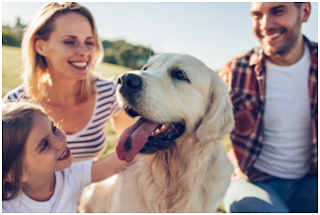Protect Your Dog from Heat Exhaustion by Life's Abundance
from their blog post 7-18-19
Every summer, our local parks department posts warning signs at the trailhead of my favorite hike warning of the dangers of overheating. Not for people. For their dogs.
The trail is five miles round trip, winding up a rocky mountain with little shade and no access to water. If you get into trouble out on the trail, you have to either be carried out or airlifted. Fortunately, most people heed warm weather warnings for themselves, bring enough water and have the appropriate hiking attire, all of which help make rescues a rare event. The same cannot be said for their dogs, unfortunately … hence the sign.
Dogs love us and want to go along with whatever we ask them to do. This leads to dangerous situations when well-meaning nature lovers, who just want to include their canines in summer activities, forget the very real risk of heat exhaustion and heat stroke in dogs.
Risk Factors
Heat exhaustion doesn’t come out of nowhere, making it a problem we can both anticipate and prevent. That’s a good thing! While any pet or person can experience this condition, there are specific risk factors that you need to be aware of that make some dogs more susceptible to heat than others:
Age: Both the very young and the very old are more affected by heat. Regulating body temperature is a complicated physiological process, and pets at both ends of the age spectrum have more difficulty fending off temperature extremes.
Breed: You can’t walk ten feet these days without encountering an adorable Frenchie or Boston Terrier, but hopefully those walks are taking place early in the morning (hint, hint). Any squishy-faced breed (referred to as brachycephalic) is more prone to heat stroke due to their anatomy.
Coat: When I first adopted my black lab Kekoa, I was shocked at how much more quickly she heated up during walks. Why? Dark-coated fur absorbs more heat. In addition, those beautiful thick coats that keep breeds like Huskies toasty in the snow can also predispose them to heat-related illness.
Weight: As if we needed another reason to warn against carrying extra pounds, obesity is a known risk factor for heat exhaustion and heat stroke.
All of these risk factors add up. Let’s just say, if you have a black-coated, overweight, senior French bulldog, you might as well just follow them around with a fan and a thermometer all summer (and get them on a diet!).
Early Warning Signs
Heat exhaustion and heat stroke are progressive illnesses. It takes time for a pet to go from normal body temperature to dangerously hot. During that process, he or she may exhibit any one of the following signs, meaning it’s time to stop what you’re doing and get into the shade.
Panting: Yes, dogs pant as part of the normal cooling process- but if they’re panting so much they can barely pause to take a sip of water, they’re too hot.
Drooling: Excessive drooling is a sign of heat exhaustion. Paradoxically, so are dry gums. A pet’s mouth should be moist but not dripping with saliva, nor should the gums be dry to the touch.
Red gums: Gums should be pink. Dark gums, which can look nearly red, can signal a problem.
Late-Stage Warning Signs
If your pet exhibits any of these during hot weather, I would proceed to a veterinarian immediately. Left unchecked, heat stroke can sadly lead to kidney failure or even death.
- Difficulty breathing
- Staggering gait
- Seizures
- Petechiae (pinpoint red spots on gums & mucous membranes)
- Blood in stool or tarry, dark stool
What Should You Do if You Suspect Heat Exhaustion or Stroke?
If you’re not sure how severe your pet’s symptoms are, you can always call your local veterinary ER for advice. It’s better to be safe than sorry, especially with something as dangerous as heat stroke.
Avoid the temptation to douse your pet in cold water. It can actually worsen things by causing the peripheral blood vessels to constrict. You can spray your pet with cool (not cold) water while you proceed to the ER.
The best solution is, as always, prevention. Make sure pets have plenty of access to shade and cold drinking water when they’re outside during warm weather. Keep them indoors entirely during significant heat waves. Avoid walks during the middle of the day. If you’re going on a hike where help is not likely to be easily accessible if you run into trouble, over-prepare.
Have a fun, and SAFE, summer!
Dr V
Dr. Jessica Vogelsang, DVM






